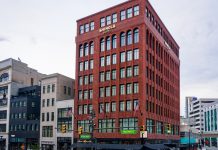 While the trend of co-living тАФ a form of housing where building residents have the opportunity to engage in organized activities and shared common spaces тАФ has gained national attention for its popularity with millennials, Richard Broder, owner and CEO of Broder & Sachse Real Estate Inc., believes the community-focused concept can be for everyone. Since his Birmingham-based development company launched its co-living, luxury apartment buildings The Albert and The Scott in Detroit, Broder says theyтАЩve excelled in their tenant retention goals, attracted local retailer partners, and become home to a number of out-of-towners. Broder recently spoke with ║┌┴╧═Ї Detroit about the concept of co-living, his companyтАЩs properties, and what new housing developments mean for the city.
While the trend of co-living тАФ a form of housing where building residents have the opportunity to engage in organized activities and shared common spaces тАФ has gained national attention for its popularity with millennials, Richard Broder, owner and CEO of Broder & Sachse Real Estate Inc., believes the community-focused concept can be for everyone. Since his Birmingham-based development company launched its co-living, luxury apartment buildings The Albert and The Scott in Detroit, Broder says theyтАЩve excelled in their tenant retention goals, attracted local retailer partners, and become home to a number of out-of-towners. Broder recently spoke with ║┌┴╧═Ї Detroit about the concept of co-living, his companyтАЩs properties, and what new housing developments mean for the city.
║┌┴╧═Ї Detroit: Why co-living and why now in Detroit?
Richard Broder: ThereтАЩs probably been a pent-up demand for that style of living in Detroit, but never really the opportunity for it. WeтАЩd love to own it as our innovation, but itтАЩs not. It is the trend in apartment communities across the nation. WhatтАЩs different about Detroit is that nobody was doing it here. [Co-living is] what people want. ItтАЩs accepted. People of all age, race, gender, profession тАФ theyтАЩre looking for stuff to do with people they like to be with. ItтАЩs just building a community.
How do you build a community within your properties?
We have events at our properties and then we have hosted events at other venues for our residents. WeтАЩll have events that involve [sports], the arts, music, culture, food, alcohol тАФ although we combine that with everything [laughs]. If you donтАЩt want to learn how to make sushi, because youтАЩre never going to do that and you donтАЩt find that interesting, but youтАЩd like to go to a Tigers game with the gang that you live with here at the building, thatтАЩs an opportunity as well.
We have extremely high retention in our properties, much higher than our suburban properties. Not only is [this because of] solid management, but itтАЩs things like our concierge, what our properties look like, how theyтАЩre kept up, the activities we do with our residents, the way in which we communicate. WeтАЩre trying to model our exceptional service on a hospitality model. Whatever you need, whenever you need it.
What was the process to create co-living concepts in Detroit?
[Our team] got on airplanes together, and we flew around the country, visited similar product, stole great ideas, and took good notes. [We] tried to learn what did and didnтАЩt work. We didnтАЩt want to go to New York and L.A. or San Francisco, because those are very unusual markets. They seem to have lives of their own. We wound up in the Midwest. We studied Grand Rapids, we studied Minneapolis, we studied Chicago, we went to Atlanta. We donтАЩt really want to copy anyone, but we know whatтАЩs working in other communities and we want to take what works there and make it тАЬDetroit-ized.тАЭ
Every place you turn [in the buildings], we would expect you to say тАЬwow, I havenтАЩt seen that in Detroit,тАЭ or тАЬwow, I didnтАЩt expect that.тАЭ What IтАЩm after is the тАЬwowтАЭ at every turn. ThatтАЩs why we spent so much time trying to figure out what worked. Did we make mistakes? Yeah, we probably made dozens. WeтАЩve got a long list of lessons learned for our future developments, but otherwise IтАЩd say that we executed it very well, and weтАЩre very happy with what we did.
тАЬWhat IтАЩm after is the тАШwowтАЩ at every turn. ThatтАЩs why we spent so much time trying to figure out what worked.тАЭ тАФ Richard Broder
How do Broder & SachseтАЩs properties fit into the needs of the cityтАЩs longtime residents?
Do we necessarily preclude a certain constituency in our buildings? You have to income qualify to live in an apartment building. If you canтАЩt, you canтАЩt. But thatтАЩs true anywhere. But there are a lot of interesting things happening in the low-income space as well. A block from [The Scott] in Brush Park, thereтАЩs two brand new low-income tax credit buildings being built by Bedrock. Mixed-income neighborhoods are normal and valued, which is not something Detroit has had. WeтАЩve had low-income neighborhoods, so now weтАЩre going mixed.
ThereтАЩs a wide range of cultural events [in Detroit] ranging from free to not free, a wide range of restaurants ranging from affordable to not. ThereтАЩs just a lot more choices than there ever were, and I donтАЩt think they necessarily exclude groups of people. I think thereтАЩs been a ton of new stuff overall coming [to Detroit] that can appeal to a lot of different people. WeтАЩre trying to become a much more normal city.
Given your experience, what is your advice for other developers working in Detroit?
They need to engage with the neighborhood and they need to engage with the city. I can tell you that weтАЩve done it with varying degrees of success, and thatтАЩs another learning curve as well. We want to be part of a neighborhood. We want neighborhoods to be healthy, and what that means is they need to be mixed in many ways тАФ mixed income, mixed ethnically, racially. ThatтАЩs really the test for success. Those are tall tasks sometimes when making developments work right.
The Properties
The Albert:
The first co-living space launched by Broder & Sachse, The Albert in Capitol Park opened July 2015. The historic building, designed by architect Albert Kahn in 1929, is 12 floors high and features 127 apartment units. Retailers, which occupy the first floor, include Bird Bee, City Bark, Dessert Oasis Coffee Roasters, Detroit Bikes, and Go! Sy Thai.
The Scott:
Opened in December 2016, this Brush Park apartment building is home to nearly 200 residential units. The Carter Snell Skin Center, a private practice dermatology office, was the buildingтАЩs first retail space. A bakery called For the Love of Sugar opened late last year.
Resident activities:
The properties have offered events to residents that include Barre & Pinot Noir, Sushi Making 101, a Detroit Institute of Arts tour, Brunch in Brush Park, Detroit Foundation Hotel VIP Art Tour, and more.
┤б│╛▒Ё▓╘╛▒│┘╛▒▒Ё▓є:╠¤
Perks at the buildings include concierge service, fitness centers, community kitchens, community lounges, bike storage, secured storage areas, pet grooming rooms, dry cleaning delivery services, and on-site maintenance.
|
| ╠¤ |
|








